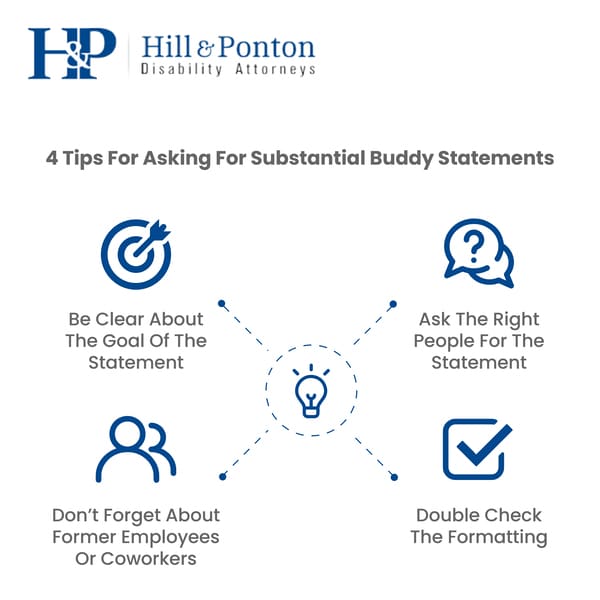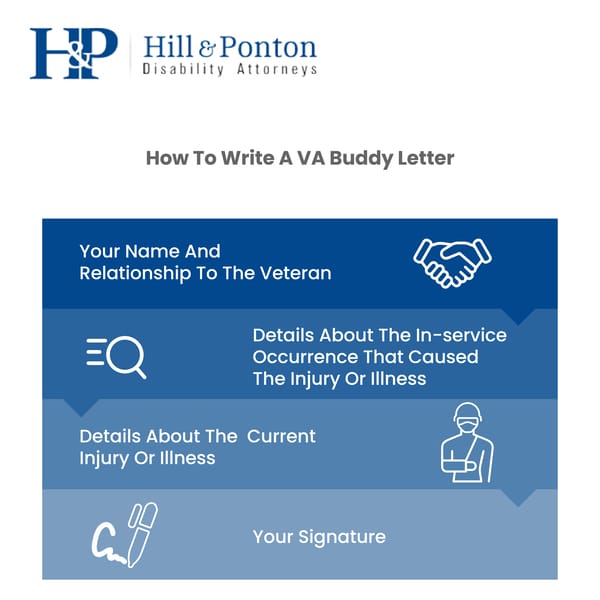When seeking disability benefits through the United States Department of Veterans Affairs, veterans need to prove that their injury or illness is connected to military service.
An important source of evidence that can be gathered by veterans fighting for service connection or an increased rating is buddy statements.
Buddy statements, or buddy letters, provide firsthand information about the incident that caused the disability, as well as the disability itself.
A substantial buddy statement can be critical to a veteran’s VA disability benefits.
This guide will break down the basics of buddy statements, how to ask for one when making your VA disability claim, and how to write one for another veteran.
What Are Buddy Statements?
A buddy statement is a crucial document in supporting a veteran’s claim for service-connected disabilities, especially when official records are missing, lost, or destroyed.
It is a written account from someone familiar with the veteran’s condition, often a spouse, family member, friend, or fellow service member, which corroborates the veteran’s claim.
Under the Veteran’s Claims Assistance Act of 2000, the VA is required to assist veterans in developing their claims and must consider lay evidence like buddy statements.
These statements are submitted using VA Form 4138 and play a significant role in providing evidence for incidents or injuries that occurred in service but lack formal documentation, ensuring the veteran’s experiences are validated and considered in their claim.
Why are Buddy Statements Important in Developing Your VA Claim?
Most medical facilities destroy medical records after 7-10 years. In these situations, if credible statements can close the gap on dates of treatment that are missing due to unavailable records, it can help tremendously with your claim.
For example, many veterans returning from war may experience symptoms of Post-Traumatic Stress Disorder (PTSD), but frequently fail to seek treatment until urged by a loved one who witnesses changes since their return from service.
These close friends or relatives can provide information on difficulties with day-to-day activities noticed during that period, which would help fill in gaps in medical records.
What Should a Buddy Statement Include?
Buddy statements are key in supporting both service-connection claims and requests for increased ratings.
They offer personal insights into a veteran’s condition that official records and examinations might miss.
Here’s how to focus your buddy statement effectively:
For Service-Connection Claims
- Source: Primarily from fellow service members.
- Content: Focus on the incident during service causing the disability.
- Purpose: To corroborate incidents or injuries not documented in service records, such as combat injuries, PTSD stressors, or exposure to hazardous substances like Agent Orange.
For Increased Rating Claims
- Source: Mainly from family and friends.
- Content: Highlight the progression of symptoms and the impact on the veteran’s daily life.
- Purpose: To provide a day-to-day account of the veteran’s condition, supplementing the limited snapshot provided by Compensation and Pension examinations.
Buddy statements can bridge the gap between sparse or non-existent records and the reality of a veteran’s service-related condition, offering a comprehensive view of its daily impact.

Tips from the Hill & Ponton Team for Asking for Substantial Buddy Statements
1. Be clear about the goal of the statement.
When seeking buddy statements for your claim, especially for an increased PTSD rating, focus on choosing individuals who have closely observed your symptoms worsen over time. These statements should detail changes in your mental health, like increased irritability, depression, or anxiety, highlighting specific incidents when possible. The point is to clearly demonstrate the progression of your symptoms to support your claim for an increased rating.
2. Ask the right people for the statement.
For service connection claims, like a back injury from a fall during service, the most compelling buddy statements come from those who witnessed the event, usually fellow service members. If finding a witness is challenging due to time, consider statements from family or friends who were informed about the incident at the time, such as through letters. Detailed accounts from any of these sources can significantly bolster your claim.
3. Don’t forget about former employees or coworkers.
If one of your goals is a total disability rating based on individual unemployability, a good potential source for buddy statements is former employers or coworkers. They may be able to speak to your level of functioning in the workplace, specifically any accommodations you were given or problems that your disability caused. As you can tell, you will want to keep in mind when asking “buddies” for statements whether you are looking for service connection or an increased rating.
4. Double check the formatting.
When creating a buddy statement, ensure it includes the writer’s contact details—full name, address, and phone number—along with the veteran’s full name. It should detail the writer’s observations, focusing on either the incident leading to the disability or symptom progression. The statement must be signed on a VA 4138 form, or if not using this form, it should be notarized to affirm its truthfulness as required by the VA.

How to Write a VA Buddy Letter: More Hill & Ponton Team Tips to Consider
If a veteran has asked you to write a buddy statement, remember that following a few best practices can help the veteran earn VA benefits for their injury or illness.
In general, you’ll want to stick to three to four paragraphs.
The letter should include:
- Your name and relationship to the veteran
- Details about the in-service occurrence that caused the injury or illness
- Details about the veteran’s current injury or illness
- Your signature
Here are some tips to help you write the letter:
- Be clear about your relationship with the veteran.
- In the first section of the buddy letter, state your name and how you know the veteran. It can also be useful to state how long you have known the veteran. For example, you might say, “My name is __________, and I served in the United States Army with [Veteran]. We entered the service together in 2001 and were deployed to Afghanistan.”
- Include as many details as possible. In the second section of the buddy statement, you will write about the service-connected injury or illness, as well as the event that caused it (if applicable). Be sure to include as many details as possible. For example, “In January of 2002, I witnessed the bomb blast that caused [Veteran] to fall backwards and hit his head. [Veteran] spoke often of headaches, dizziness, and tinnitus after receiving medical treatment.”
- Include only the information you know. While you want to include as many details as you can, it’s important to only include information that you know is true. So, if you are writing a buddy statement for a family member with PTSD, you might write, “My brother, [Veteran], currently shows signs of anger issues, anxiety, panic attacks, and insomnia. He has angry outbursts about three times per week.” Be sure to only include facts like this if you know that they’re true.
- Remember to sign and date the letter. When you sign the letter and add the date, you’ll want to include a statement that certifies that you’re telling the truth in the buddy letter. This typically says, “I certify that the statements on this form are true and correct to the best of my knowledge and belief.”

VA Buddy Letter Example
While each VA buddy statement will be slightly different, here is a VA buddy letter example to consider.
In this example, the brother of a veteran is writing on behalf of his brother with PTSD.
This could be beneficial for the wife or spouse of a veteran who would like to write a VA buddy letter.
“To whom it may concern,
My name is John Doe, and I am the brother of veteran [Insert Veteran’s Name]. I am writing this statement on behalf of [Insert Veteran’s Name].
I have known [Insert Veteran’s Name] for his entire life, and we currently live in the same town. I spend time with [Insert Veteran’s Name] three to four times per week.
Prior to [Insert Veteran’s Name]’s deployment to Iraq, he was a happy, kind, and energetic person. He did not show signs of anger, irritability, or anxiety before his time in the service.
Following [Insert Veteran’s Name]’s discharge from active duty in Iraq, I noticed a significant change in his behavior. [Insert Veteran’s Name] displayed angry outbursts about three times per week. He has trouble sleeping, and speaks to me regularly about his panic attacks. [Insert Veteran’s Name] has also spoken to me about his mental health issues, including flashbacks to his time in active duty service. These symptoms have affected [Insert Veteran’s Name]’s ability to hold a job, spend time with his family, and enjoy daily life.
[Insert Veteran’s Name]’s PTSD symptoms have persisted, and he still experiences symptoms today. I believe that his post-traumatic stress disorder resulted from the mental stress of combat and active duty.
Signed,
John Doe
November 1, 2020
I certify that the statements on this form are true and correct to the best of my knowledge and belief.”
If a Veteran knows someone who has knowledge about his or her disabilities, the Veteran may want to ask the individual to provide a buddy statement, which can add to the evidence that supports their claim.
While buddy statements are not a replacement for a nexus from a medical professional, these letters are another important component of a veteran’s disability claim or appeal for a higher VA rating.
How Do You Submit a Buddy Statement?
When submitting a buddy letter as evidence in your claim for VA disability benefits, you can do so in two ways:
- VA Form 4138: The VA Form 21-4138, or Statement in Support of Claim, is one avenue for submitting a buddy statement. This is typically the easiest way to send the letter to the VA. Keep in mind that by filling out and signing this form, you are confirming that the information in the statement is true.
- Affidavit With a Notary: If you don’t want to use VA Form 4138 when submitting your buddy statements, you may consider obtaining an affidavit with a notary. This is another way to swear that the testimonies in the buddy statements are true.
When Should You Submit a Buddy Statement?
Veterans may consider including buddy letters in their claim when they are missing key evidence like medical records.
However, veterans can also include these statements as additional evidence to support existing medical records.
Here are some examples of when buddy statements can be particularly helpful:
- Post-Traumatic Stress Disorder: In PTSD cases, it can be helpful to have statements from family members confirming the change in a veteran’s behavior before and after the service. For example, a veteran’s parent may state that while the veteran’s personality was friendly and upbeat before the service, they became withdrawn and anxious after.
- Military Sexual Trauma (MST): Buddy statements can also be particularly helpful in MST claims. This is particularly true if a service member didn’t receive immediate medical attention following the incident. Buddy statements from close friends and fellow service members can support that the incident occurred and that the veteran’s current mental health symptoms are connected to the MST.
- In-Service Personal Assault: Similar to MST, in-service personal assault cases may require first-hand knowledge of the veteran’s experience. Military co-workers, for example, may have witnessed the event first-hand or noticed a change in the veteran’s health or behavior afterward.
While these are some prominent examples of when statements from friends and family members can be helpful, these letters can always be useful in confirming a veteran’s current symptoms and the in-service event.
Content Review
Cassandra Crosby, an Accredited Agent and claims advocate for Matthew Hill & Shelly Mark’s teams, reviewed the information provided in this post.



